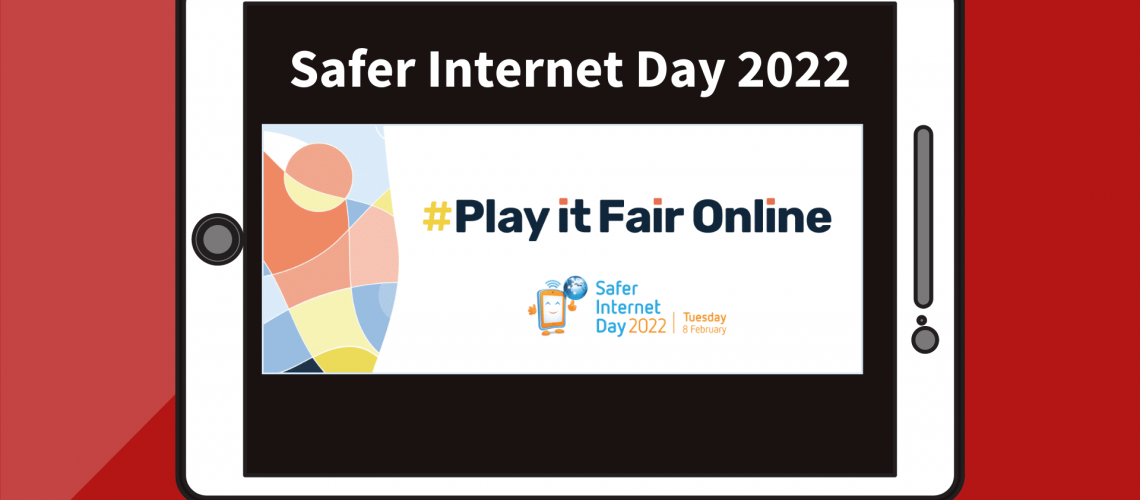This Tuesday February the 8th is Safer Internet Day. An important day on the global calendar and a great reminder of the importance of staying safe online. The theme of this year’s Safer Internet Day is ‘Play it Fair Online’. Just as in any environment, be that workplace, household, school yard or sporting field, playing it fair is an age old adage to which we should always be striving. So here are a few ways we can continue to ‘play it fair online’ both for ourselves and for our young people.
Play at the right level
There is a world of media out there and a whole world of people that one can connect with online. When it comes to young people especially, we must ensure they are playing at the right level. We want them to connect with the right people, play games that are suitably challenging but developmentally appropriate and hang out on social media and online spaces that are OK for their level of social and emotional maturity. When we play out of our league, we may well end playing against opponents with an unfair advantage and environments that are beyond our capabiltities. For parents, this may mean checking age recommendations, reading those reviews, playing that game or hanging out on that social network yourself, in order to become aware of the pitfalls and to ensure the playing arena is one they can manage.
First and foremost, it has to be fun
When we spend time online and it stops being fun, then it stops being a safe and positive use of our time. When we are feeling excluded, being bullied, abused, when we are constantly comparing ourselves to what everyone else is doing or when we are left feeling depleted, threatened, or fearful in any way, we must abort the game, leave the playing field or make changes to our teammates or opponents. We must be aware of the impacts our time online has on us, the tools we have at hand to ensure we don’t accept certain behaviours from others and continually maintain control over our experiences.
Spend some time on the bench
Too much of anything is never a good thing, so of course we need to balance time with playing online to spending some time doing other pursuits and most importantly time resting. Rest and recovery is a crucial component of any activity and the same must surely be said for time connected to a device. Having regular breaks throughout the day, making time for all of the other things that matter and getting plenty of sleep away from a device must be a priority. Getting that time disconnected from a device allows us to reset the brain and the body, to give the eyes a rest and give ourselves the best chance to get up again ready to play and perform at our best.
Pick someone up when they are down
Sometimes we see people having a tough time online. Being abused, being excluded, or showing signs that all is not well. Reach out a hand to lift people up, check in on them, let them know someone has their back. Call out abuse online, report people when you see them abuse others. Remove yourself from a group chat that is turning nasty and be the one to call out bad behaviour.
Steer clear of personal attacks
Keep arguments, differing opinions or opposing interpretations to a civil nature based on the issue at hand and without reverting to personal attacks. Just as we can cheer and support from the sidelines or get around our teammates on the sporting field, we do so without abusing umpires, making personal jibes at opposition and we stick to the game or the issue at hand. When having a conversation with someone online, the minute it gets personal, gets abusive or moves away from rational and considered conversaton, is the minute we need to consider aborting that conversation, blocking or muting that person, handing out our own version of a red card and moving on without their further input.
Not everyones follows the rules: be prepared for that
Whilst of course we would like everyone to play it fair online, we also know that unfortunately, there are always going to be those that don’t play by the rules. There will continue to be those that want to cheat others or give themselves an unfair advantage to bring someone down. For those times we need to be building up our resilience to manage those situations and to steer clear of people that seek that pathway. We need to know when to walk away, when to shrugg our shoulders, when to pick up our bat and ball and leave the playing field in order to preserve our own safety and wellbeing.
Incorporate some post game analysis
Everytime we spend time online it can be helpful to reflect on the experience and monitor the effects and impacts of that time online. Are there some people you don’t need to follow right now? Did you find yourself mindlessly scrolling with little conscious thought? Is the content you are consuming of any value? Are you feeling more agitated than you were before you got online? Regular post play reflection and analysis can ensure that you are continuing to monitor the effects of your time online and remain in control of your online experiences.
In all walks of life, playing it fair should always be the common goal. Use this Safer Internet Day as a way to continue the conversations around all the ways you can play it fair online, every time and in every place online.

